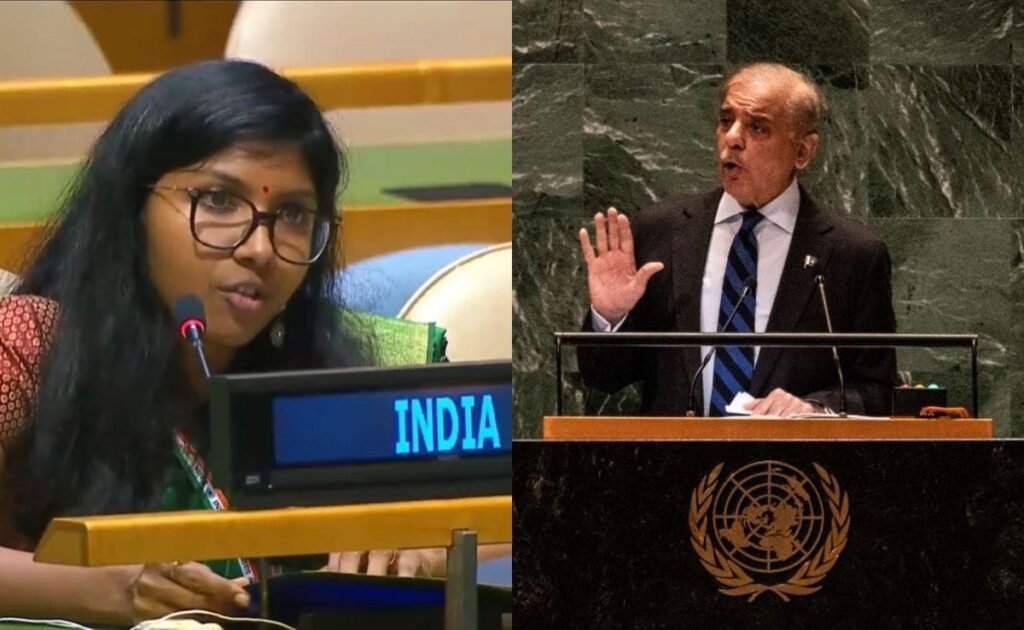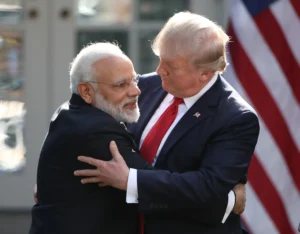
India Hits Back at Pakistan Over Kashmir Issue Following Shehbaz Sharif’s UNGA Address

The recent address by Pakistan’s Prime Minister Shehbaz Sharif at the United Nations General Assembly (UNGA) has reignited tensions between India and Pakistan, particularly regarding the contentious issue of Jammu and Kashmir. In his speech, Sharif urged India to reverse the abrogation of Article 370, which granted special status to Jammu and Kashmir before its revocation in August 2019. He emphasized that a peaceful resolution to the Kashmir issue is essential for achieving durable peace in the region, drawing parallels between the struggles of Kashmiris and Palestinians for self-determination.
Key Points from Shehbaz Sharif’s Speech
- Call for Dialogue: Sharif called on India to engage in dialogue for a peaceful resolution concerning Jammu and Kashmir, highlighting that the region’s people have struggled for their rights for over a century.
- Accusations Against India: He accused India of employing “brutal coercion” in Kashmir, claiming that this has perpetuated a legacy of resistance among Kashmiris, referencing Burhan Wani, a militant figure killed by Indian forces.
- Islamophobia Allegations: Sharif also raised concerns about rising Islamophobia globally, specifically pointing to what he described as a “Hindu supremacist agenda” in India aimed at subjugating its Muslim population.
India’s Response
In a swift rebuttal, Indian diplomat Bhavika Mangalanandan exercised India’s “Right of Reply,” condemning Sharif’s remarks as “hypocrisy at its worst.” She highlighted Pakistan’s history of using cross-border terrorism as a tool against India, citing attacks on Indian Parliament and other significant locations. Mangalanandan asserted that Jammu and Kashmir is an integral part of India and criticized Pakistan for its own human rights violations against minorities.
- Consequences of Terrorism: The Indian diplomat warned that “cross-border terrorism against India will inevitably invite consequences,” reinforcing India’s stance on national security and territorial integrity.
- Historical Context: The ongoing conflict over Kashmir has been a focal point of Indo-Pak relations since the partition in 1947. India’s abrogation of Article 370 has been met with international scrutiny but has also been firmly defended by New Delhi as a necessary step towards integrating the region fully into India.

What are India’s expected countermeasures after Shehbaz Sharif’s speech
India’s expected countermeasures following Shehbaz Sharif’s recent speech at the United Nations General Assembly (UNGA) are likely to be multifaceted, focusing on diplomatic, military, and strategic responses.
Diplomatic Rebuttal
- Right of Reply: India has already exercised its “Right of Reply” at the UNGA, with Indian diplomat Bhavika Mangalanandan condemning Sharif’s remarks as “hypocrisy at its worst.” She emphasized Pakistan’s history of using terrorism against India and reiterated that Jammu and Kashmir is an integral part of India.
- International Advocacy: India is expected to continue its efforts to counter Pakistan’s narrative on Kashmir by engaging with international partners and emphasizing its stance on the region’s status. This includes highlighting Pakistan’s alleged support for terrorism and human rights violations within its borders.
- Highlighting Internal Issues in Pakistan: Indian officials may focus on Pakistan’s internal challenges, such as its record on minority rights and governance issues, to undermine Pakistan’s credibility on international platforms.
Military Preparedness
- Enhanced Military Readiness: In response to Sharif’s threats regarding military actions, India may bolster its military readiness along the Line of Control (LoC). This could involve increased surveillance and troop deployments to deter any potential aggression from Pakistan.
- Defensive Posturing: India might also enhance its defensive capabilities in Jammu and Kashmir, ensuring that security forces are prepared for any escalations in violence or cross-border infiltration attempts.
Strategic Communications
- Public Messaging: The Indian government will likely ramp up its public messaging campaigns to inform both domestic and international audiences about its perspective on Kashmir, emphasizing peace and stability as core objectives while framing Pakistan’s actions as destabilizing.
- Engagement with Global Powers: India may seek to engage with key global powers to garner support for its position on Kashmir and counter any diplomatic gains made by Pakistan through its UNGA address.

How has tThe international community’s response to Shehbaz Sharif’s address at the United Nations General Assembly (UNGA) has been characterized primarily by India’s strong rebuttal and Pakistan’s continued advocacy for its stance on Kashmir.
India’s Response
- Stern Rebuttal: India exercised its “Right of Reply” immediately after Sharif’s speech. Bhavika Mangalanandan, India’s First Secretary at the UN, labeled Sharif’s remarks as “hypocrisy at its worst,” emphasizing Pakistan’s history of using terrorism as a state policy. She highlighted that Pakistan has a global reputation for terrorism and accused it of orchestrating numerous attacks against India, including the 2001 Indian Parliament attack and the 2008 Mumbai attacks.
- Focus on Terrorism: Mangalanandan stated that any discussion regarding a “Strategic Restraint Regime” with Pakistan is irrelevant unless terrorism is eradicated. She reiterated that “cross-border terrorism against India will inevitably invite consequences,” reinforcing India’s stance on national security.
- Highlighting Human Rights Violations: In her rebuttal, Mangalanandan also pointed out Pakistan’s internal issues, accusing it of human rights abuses and referencing historical events like the genocide of 1971 in Bangladesh. She criticized Pakistan for lecturing others on intolerance while facing its own significant challenges.
Pakistan’s Position
- Continued Advocacy: Following India’s rebuttal, Pakistan exercised its own “Right of Reply,” rejecting India’s claims as “baseless and misleading.” The Pakistani delegation reiterated its call for a referendum in Jammu and Kashmir, aligning with UN Security Council resolutions.
- Global Appeal: Sharif’s speech aimed to garner international support for Pakistan’s position on Kashmir, drawing parallels between the struggles of Kashmiris and Palestinians. He urged India to reverse the abrogation of Article 370 and engage in dialogue for a peaceful resolution.
International Observations
While specific reactions from other nations or international organizations were not highlighted in the immediate aftermath of the speeches, the UNGA typically serves as a platform where countries express their positions without necessarily taking sides in bilateral disputes. Historically, Pakistan has struggled to gain substantial international traction on the Kashmir issue despite frequent mentions at various forums.he international community responded to Shehbaz Sharif’s address.
What was the reaction from other countries at the UN General Assembly

The international community’s reaction to Shehbaz Sharif’s address at the UN General Assembly has been mixed, reflecting the complexities of geopolitical alliances and the ongoing tensions between India and Pakistan.
Key Reactions
- India’s Strong Rebuttal: India responded vehemently to Sharif’s speech, with its First Secretary at the UN, Bhavika Mangalanandan, condemning Pakistan’s history of terrorism. She emphasized that Pakistan’s claims regarding Jammu and Kashmir were hypocritical, given its own record of violence and instability. Mangalanandan stated that “cross-border terrorism against India will inevitably invite consequences,” reinforcing India’s position on national security .
- Pakistan’s Defense: Following India’s rebuttal, Pakistani diplomats defended Sharif’s remarks, arguing that the UN Security Council has called for a plebiscite in Jammu and Kashmir. They framed India’s response as an attempt to distract from its own issues regarding human rights and governance .
- Support from Muslim-majority Countries: Several countries within the Organization of Islamic Cooperation (OIC) expressed solidarity with Pakistan’s stance on Kashmir. They reiterated their support for the right to self-determination for the Kashmiri people, reflecting a broader sentiment among many Muslim-majority nations .
- Mixed Responses from Other Nations: While specific statements from other countries were not highlighted in immediate reports, there is an expectation that nations aligned with either India or Pakistan will continue to voice their positions based on their diplomatic interests. Historically, countries like China have supported Pakistan in such forums, while Western nations tend to align more closely with India’s narrative regarding terrorism.
- Global Observers: Some global observers noted the ongoing deadlock in addressing the Kashmir issue at international forums, suggesting that while speeches may resonate domestically, they often do not lead to actionable outcomes on the ground.

Conclusion
The reactions at the UNGA illustrate the polarized views surrounding the Kashmir issue and highlight how geopolitical alliances shape responses to such addresses. As both India and Pakistan continue to assert their narratives on international platforms, the international community remains divided, with calls for dialogue overshadowed by accusations and historical grievances.
Discover more from
Subscribe to get the latest posts sent to your email.







